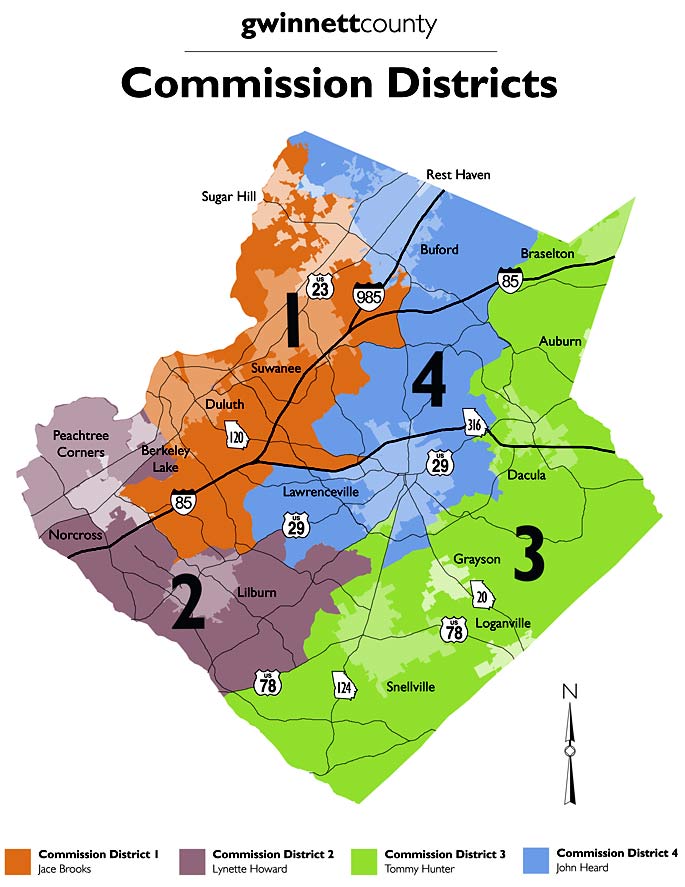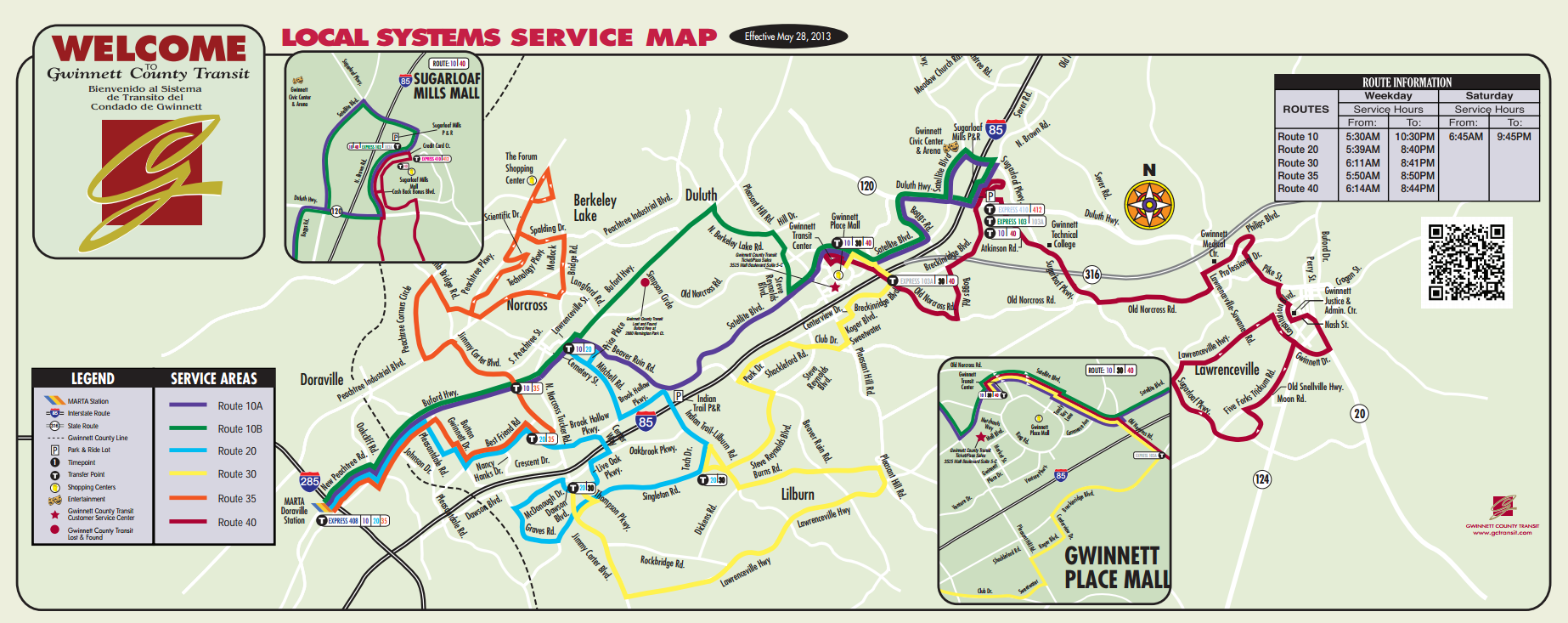/cdn.vox-cdn.com/uploads/chorus_image/image/47923781/NO_20MARTA_20Sign_20_281280x778_29.0.jpg) |
| What a welcoming sign into Gwinnett County from DeKalb! |
First some facts:
- 56% of Gwinnettians are willing to pay more for public transportation
- Half of likely voters in Gwinnett support a 1% tax increase to join MARTA
- Gwinnett is the second most populous county in Georgia
- Within the next fifteen years, the population will top one million residents
- The county is under-served by its transit system: Gwinnett County Transit
- The county has a minority-majority populace but its commissioners are all white, all Republican
- CAR OWNERSHIP IS A PRIVILEGE
- ACCESS TO PUBLIC TRANSPORTATION IS A HUMAN RIGHT
 |
| County Commissioner seats... I wonder how the gerrymandering works here to ensure Republicans maintain control of all seats, not even allowing Democrats to have a seat at the table! |
- In 1971, Gwinnett voters rejected joining MARTA. At the time, MARTA was being created to bring mass transit service across the Atlanta area. Voters in DeKalb and Fulton Counties voted to join the authority while Clayton, Cobb, and Gwinnett voters voted against the expanding authority. There were multiple reasons for this split: large costs, low densities, small populations, a tax increase, and a rural setting. Decidedly though, the large black populations of Fulton and DeKalb Counties deterred white voters of these bedroom communities into voting against the MARTA system.
- In 1990, there was a referendum in Gwinnett about joining MARTA. Again, the vote failed. This decision though was more pure. By 1990, Gwinnett was growing rapidly. It was becoming more urban and less rural. People were told to expect a massive population boom in the coming decade according to growth models. So why the denial of public transit despite the stronger need for it? Racism. White Gwinnettians didn't want black people in Atlanta to have access to their community.
- In 2001, 2002, express and then local bus service began by Gwinnett County Transit (GCT). A little too late though, as the county had already become the fastest growing county in the country at this time. Notably, local bus service primarily services middle or low-income communities, not the wealthy neighborhoods to the north and east.
- Since then: the recession has cut local bus service (essential to those who can't afford a car) while express service has been expanded to serve the Atlanta commuters. The county has continued to grow resulting in worse traffic. Bad traffic creates unhealthy smog that hurts asthmatics during the year. In addition, the county has diversified. People hold different backgrounds and different opinions than those of 1990 or 1971. It has become distinctly urban with the only remaining agricultural uses at the fringes of the county away from the major highways. Additionally, surveys and polls show Gwinnettians support expanded public transit and/or MARTA expansion.
 |
| Sorry to curse, but what the actual fuck is this kind of service? How does this adequately serve Gwinnett? Someone ask Charlotte Nash for me because I'd love to know! |
The current situation:
- Charlotte Nash, county commissioner and chairwoman, on MARTA expansion: "It's an uphill battle... Its about feeling like they don't have control of the county's transit system."
- Translation: 'Uphill battle' = her political career, she's unwillingly to jeopardize her political future by allowing a referendum, literally a decision made by the public, to go forward. 'Don't have control of the county's transit system' = don't have control of preventing poor people from moving northward. Currently, GCT is limited to local bus service in certain disadvantaged areas in the west and center of the county. Joining MARTA would mean robust local bus service for the whole county since MARTA has the funds available for this. The only problem in that is she and her cronies would no longer have a say in preventing bus service to her affluent areas. Apparently providing public transit to her constituents isn't critical as long as the rich don't have to encounter a bloody bus allowing people to get to work.
- John Heard, county commissioner: "I believe that if we put it on the ballet, a local transit SPLOST will pass -- for Gwinnett County only. Nobody wants to send our money down to the City of Atlanta."
- Translation: 'for Gwinnett County only' = he's only interested in helping the affluent Atlanta commuter, not the average Gwinnettian (or Atlantan for that matter) without a car. 'Nobody wants to send our money down to the City of Atlanta' = Democrats/black people aren't taking our money. This might sound like a harsh translation, but it's not. He is being explicitly racist in what he is saying here. If Gwinnett joined MARTA, all taxes raised would go toward the expansion of MARTA in Gwinnett. He is lying to his constituents or he is being naive. He for sure is being racist in showing his distaste towards allowing a transit service use funds to provide robust transit that will directly allow better mobility for people of color.
 |
| Dacula, on the right, in relation to the rest of the county |
What should you do? Demand your referendum! Charlotte Nash doesn't live along the 85 corridor; she lives all the way out in Dacula. She doesn't have to sit through an hour of traffic a day to get to a well-paying job that happens to be outside of the county. She doesn't grasp how bad it is. She and her fellow commissioners also don't grasp what it means to be apart of a region. Gwinnett is great, success does live here, but it is great because it relies on the greater Atlanta region. Gwinnett needs to be a part of its transportation system if it hopes to stay competitive in the future. Ask your neighbor what they would think of getting MARTA service. Chances are they wouldn't mind it!
| Remember these water towers? A moto we need to continue to live by! |
Our leaders are playing politics. It doesn't take much to read between the lines of their statements and see where their true opinions lie. Luckily, that doesn't mean we can't sway them. If enough of us raise a racket, we will get our referendum and the congestion relief and public transit that WE DESPERATELY NEED.
*A lot of this article references David Wickert's reporting from the AJC. I encourage you to read his reports of the state of transportation in the AJC. http://commuting.blog.ajc.com/2017/10/27/will-gwinnett-county-join-marta-not-likely-officials-say/
